Key takeaways:
- Pro-life advocacy emphasizes the inherent value of all human life, uniting diverse individuals with personal experiences driving their commitment to the cause.
- Legal challenges in pro-life advocacy involve navigating complex issues such as parental rights, funding regulations, and privacy, often requiring a balance between legal obligations and personal beliefs.
- Personal narratives can effectively amplify legal discussions, fostering empathy and solidarity among advocates and influencing public discourse towards legislative change.
- Building a support network, including mentorship and online communities, is essential for resilience and success in overcoming legal challenges in the pro-life movement.
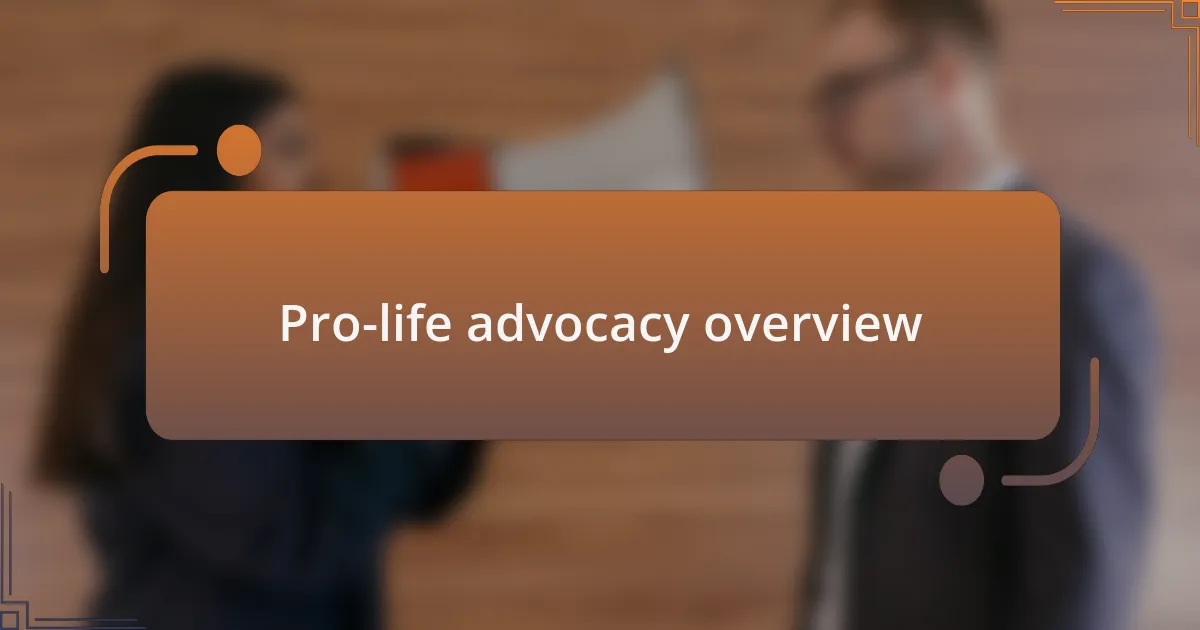
Pro-life advocacy overview
Pro-life advocacy centers on the belief that every human life, from conception to natural death, has inherent value and deserves protection. I remember attending a rally where people passionately shared stories about their journeys, highlighting the emotional weight behind the movement. It made me wonder—what drives individuals to take a stand for those who cannot speak for themselves?
In my experience, the pro-life community is incredibly diverse, bringing together people from various backgrounds and beliefs, all united by a common purpose: preserving life. I once spoke with a woman who had faced an unplanned pregnancy; her choice to keep her child was both empowering and challenging. Hearing how she turned her struggles into advocacy really showed me the profound difference personal experiences can make in this fight.
The legal aspect of pro-life advocacy is crucial, as it involves navigating complex issues surrounding abortion laws, parental rights, and healthcare access. I often find myself reflecting on how these laws impact real lives—like how a change in legislation can either empower caregivers or create obstacles. It raises important questions about justice and equity: Are we truly considering the implications of our legal frameworks on vulnerable populations?
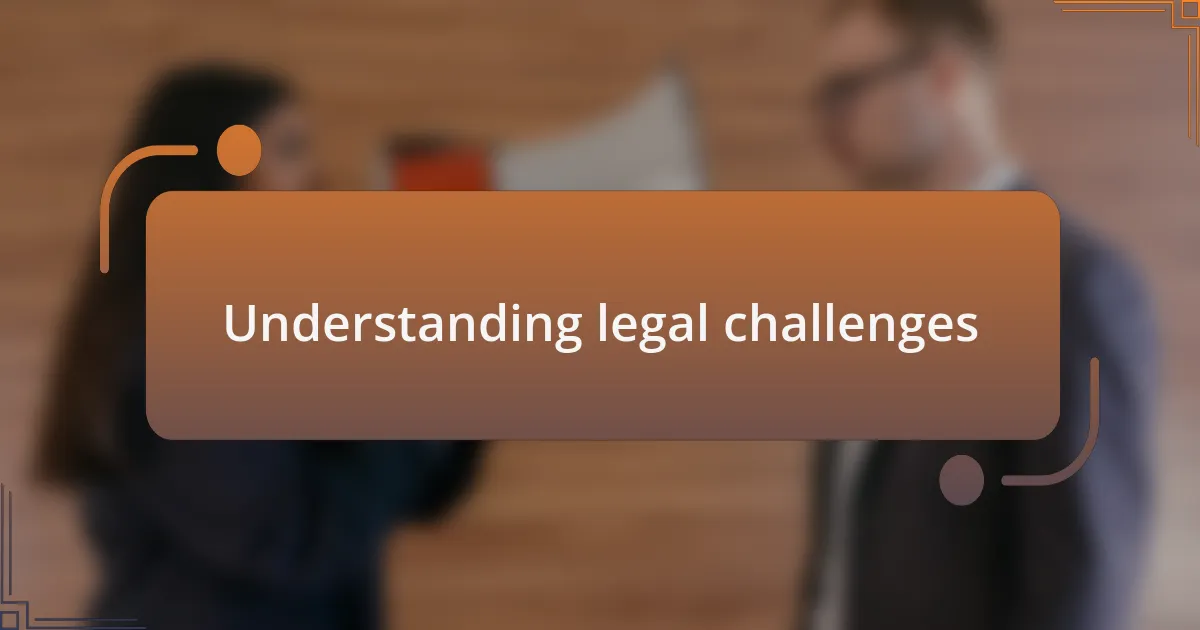
Understanding legal challenges
Understanding the legal landscape around pro-life advocacy has shaped many of my views. I remember the day a close friend of mine faced a legal battle over her parental rights after her unplanned pregnancy. Seeing her navigate court hearings, I realized how the law intersects with deeply personal choices, often complicating what should be a straightforward path to motherhood.
As I dove deeper into understanding these challenges, I began to appreciate the nuances of legislation. For example, what happens when existing laws collide with the beliefs of those advocating for life? It can feel daunting, and I found myself questioning: How can we ensure that laws not only protect unborn children but also support mothers in their journeys?
Legal challenges can often feel overwhelming, yet they also present an opportunity for growth and advocacy. I recall attending a workshop where legal experts spoke about navigating restrictive laws, offering practical tips that empowered participants to engage thoughtfully with their communities. It struck me that while the path may be fraught with challenges, every legal hurdle is also a chance to amplify our voices and effect real change.
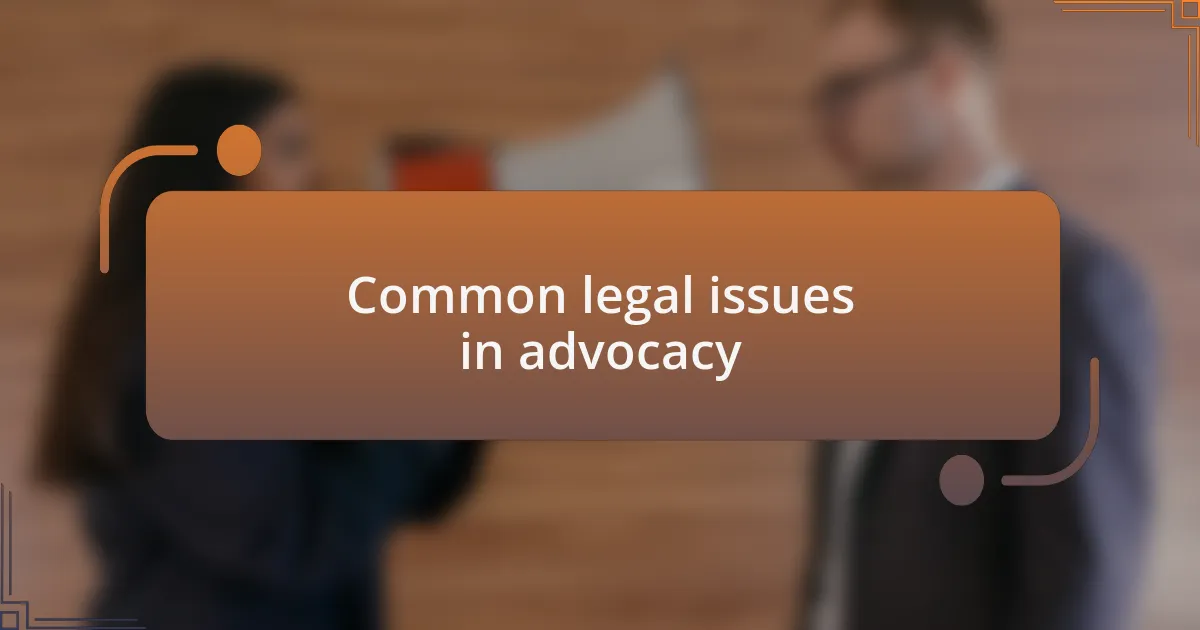
Common legal issues in advocacy
Navigating common legal issues in advocacy can feel like walking through a maze. I recall a time when I was part of a local pro-life group that faced a lawsuit over a peaceful demonstration. It was eye-opening to see how the right to free speech can clash with local ordinances, leaving us to ask: What is the balance between expressing our beliefs and adhering to the law?
Another prevalent legal challenge is the regulation of funding and resources. I remember collaborating with a charity that provided support to expectant mothers. As we explored ways to sustain our programs, we encountered legal restrictions on how donations could be used. It made me wonder, how can we foster generosity while navigating the intricate web of legal stipulations?
Moreover, privacy issues often emerge, particularly regarding personal stories shared in the public domain. I once met a courageous woman who openly shared her journey through an unplanned pregnancy at an advocacy event. While her vulnerability inspired many, it also raised questions about the legal protections for individuals sharing sensitive information. This reflection made me think: How can we create a culture of support without compromising one another’s privacy?
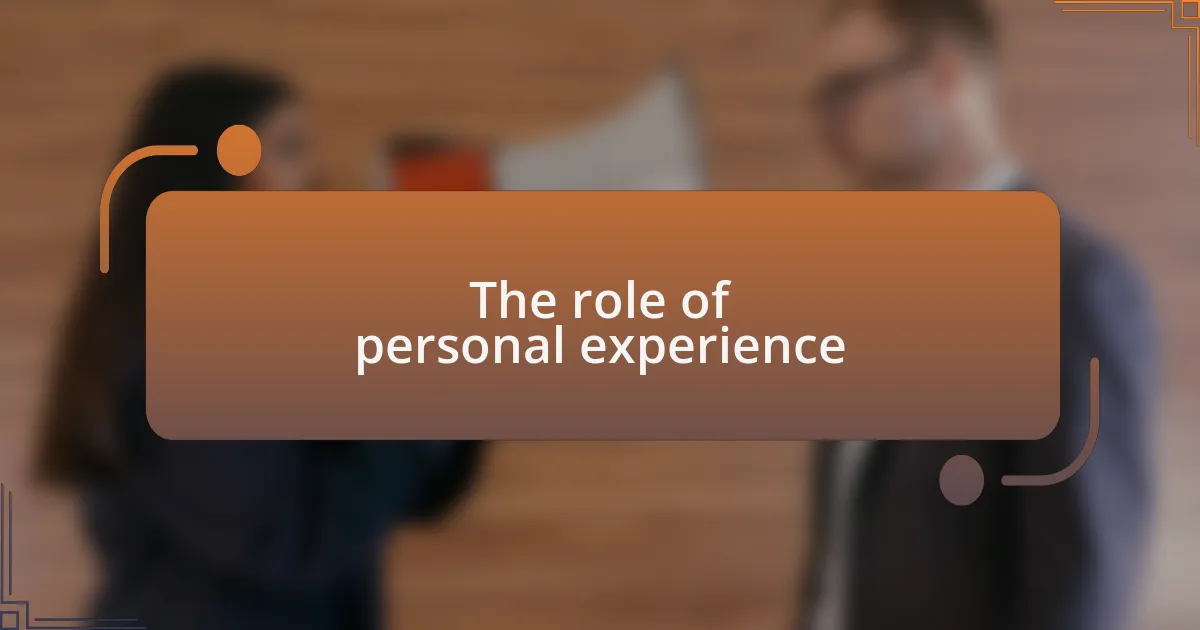
The role of personal experience
Personal experiences play a crucial role in shaping our understanding of legal challenges within pro-life advocacy. I remember a time when I was confronted with the reality of legal boundaries during a workshop we organized. One participant shared a deeply personal story about her decision-making process around abortion, which highlighted the emotional weight behind advocacy. It struck me how personal narratives can amplify legal discussions, forcing us to consider not just the rules but the human lives affected by them.
Reflecting on my journey, I find that sharing one’s experiences during legal challenges can empower others to navigate similar situations. There was a moment when I participated in a public forum where I spoke about being threatened with legal action for expressing my views. The passion in my voice resonated with the audience, and many approached me afterward, eager to share their stories. It became clear that our collective experiences could cultivate a sense of solidarity and resilience, vital for overcoming legal obstacles.
It’s fascinating to observe how personal experiences can shift the public discourse on legal issues. I recall attending a conference where a mother recounted the legal hurdles she faced while advocating for greater support for pregnant women. Her authenticity not only drew empathy but also sparked discussions about legislative changes. It left me pondering: How can we harness the power of our experiences to influence legal reforms and create a more supportive environment for those we advocate for?
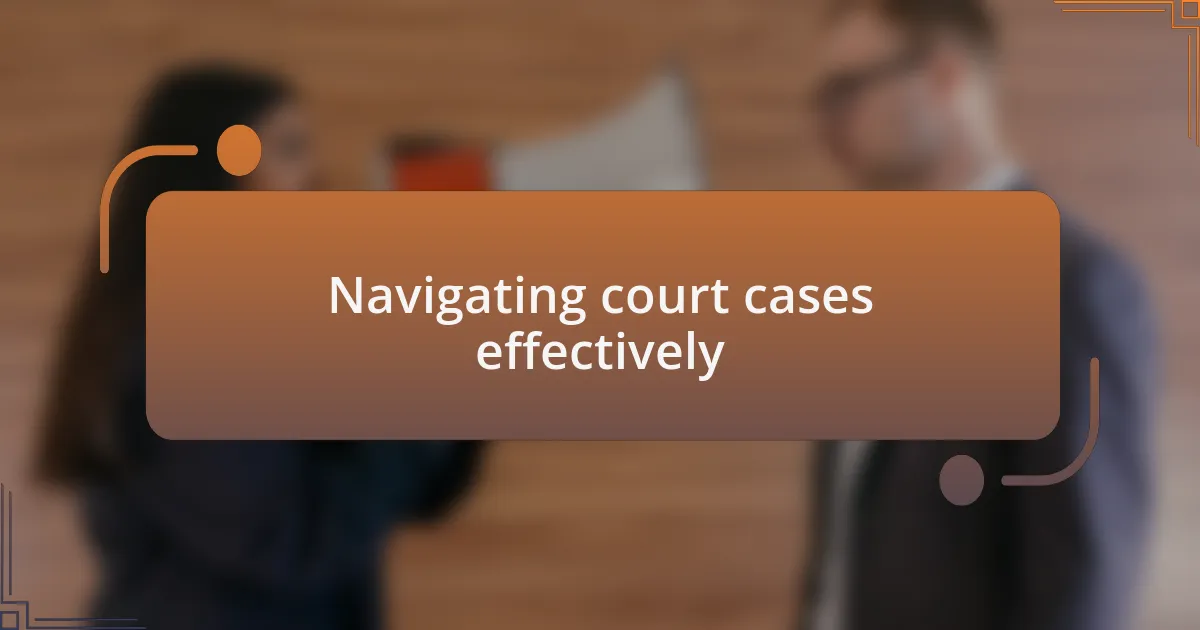
Navigating court cases effectively
Navigating court cases effectively requires a keen understanding of both the legal landscape and the emotional narratives that fuel our advocacy. I recall a particularly challenging moment when I had to prepare a brief for a critical case. As I sifted through legal jargon and statutes, I realized it wasn’t just about the law; I needed to connect our arguments to the real stories behind them. This approach not only clarified my thoughts but also strengthened our case, reminding me that empathy is as crucial as legal expertise.
During a strategy session with my team, we brainstormed ways to present our arguments that would resonate with judges and juries alike. I shared my experience of a previous court appearance, where I witnessed firsthand how a compelling story could sway opinions. It hit me then: our narratives must be front and center, effectively combining legal facts with the emotional truth of our mission. This insight underscored the importance of framing our case in a way that makes the emotional stakes clear yet remains firmly rooted in legal logic.
When preparing for court, I always ask myself: How can I ensure my message is not only heard but felt? I’ve learned that clarity in communication can make a significant difference. In one case, I simplified complex legal arguments into relatable terms that anyone can grasp. That decision sparked engaging discussions and, ultimately, a deeper understanding of our position. It’s a vital reminder that when we communicate effectively, we empower our advocates and reinforce the cause we fight for.
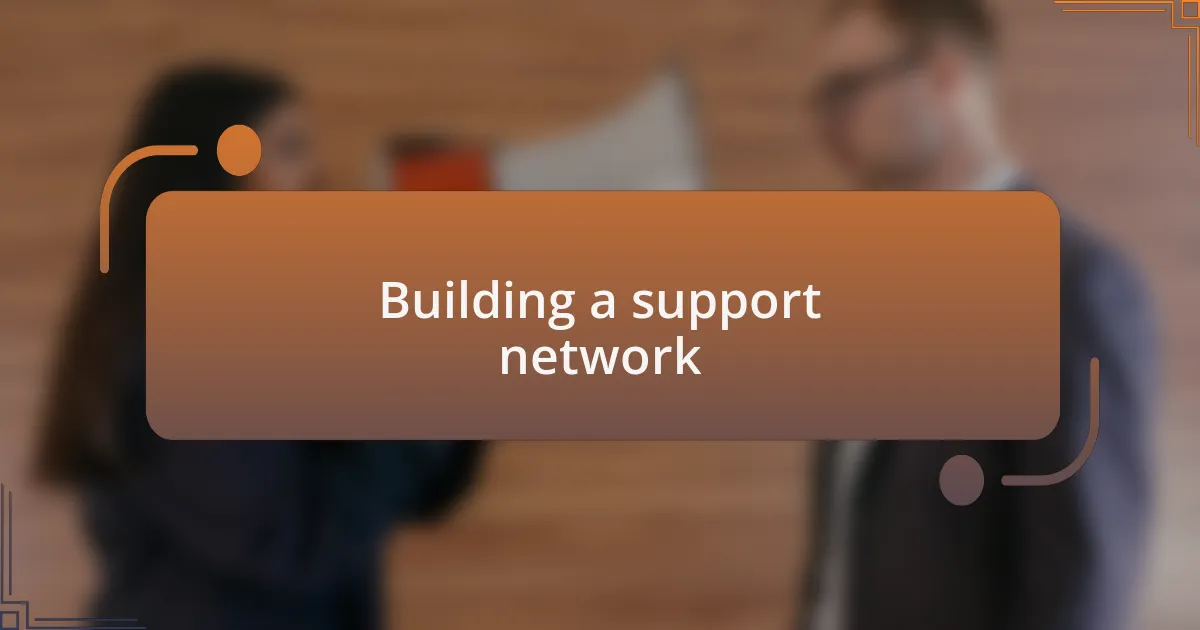
Building a support network
Building a support network is one of the cornerstones of navigating legal challenges in pro-life advocacy. When I first embarked on this journey, I underestimated the power of community. I remember attending local advocacy meetings, and there, I met fellow advocates who shared their own experiences. Connecting with others who faced similar struggles taught me that I was not alone. Have you ever felt isolated in your efforts? Trust me, finding a like-minded group can reignite your passion and commitment.
In my experience, reaching out for support isn’t just about gathering resources; it’s about building relationships. I found immense value in collaborating with mentors who had endured their own legal battles. They provided not only guidance but also a listening ear during tough times. Their insights on strategy and emotional resilience proved invaluable when I faced setbacks. Have you considered seeking out mentors in your own journey? Their wisdom can be a game-changer, offering perspectives that you may not have thought of.
Additionally, leveraging social media has been transformative in establishing my support network. I started sharing my experiences online, and soon, I connected with advocates from across the country. Unexpectedly, these virtual friendships evolved into real-life collaborations that enriched my advocacy work. Isn’t it amazing how technology can bridge distances? By embracing both local and online communities, I realized that support can come from the most unexpected places, giving a renewed sense of hope and strength to my mission.

Lessons learned from my journey
Throughout my journey, I’ve learned that resilience is essential when navigating legal challenges in pro-life advocacy. I vividly recall a moment when I faced a particularly daunting legal setback. It felt like walking through a thick fog, obscured and uncertain. But it was in those moments of doubt that I discovered I could adapt my approach and find new strength. Have you ever been surprised by your own resilience? Acknowledging my ability to bounce back made all the difference, empowering me to push forward with renewed determination.
Another lesson emerged about the value of clear communication. I learned this the hard way after a misinterpretation during a critical meeting led to unnecessary confusion and frustration. I realized that being transparent about goals and expectations is crucial when collaborating with others. Have you ever felt the frustration of unclear communication? Taking time to ensure everyone is on the same page not only eases tension but also fosters a stronger sense of teamwork.
Lastly, I found that perseverance often yields unexpected allies. One instance stands out: after sharing my legal struggles in a community forum, someone reached out who had faced similar challenges and was willing to share insights about their experience. This connection not only provided practical advice but also turned into a meaningful friendship. How often do we underestimate the power of vulnerability? I learned that sharing my story could empower others as much as it did me, transforming isolation into solidarity on this important journey.